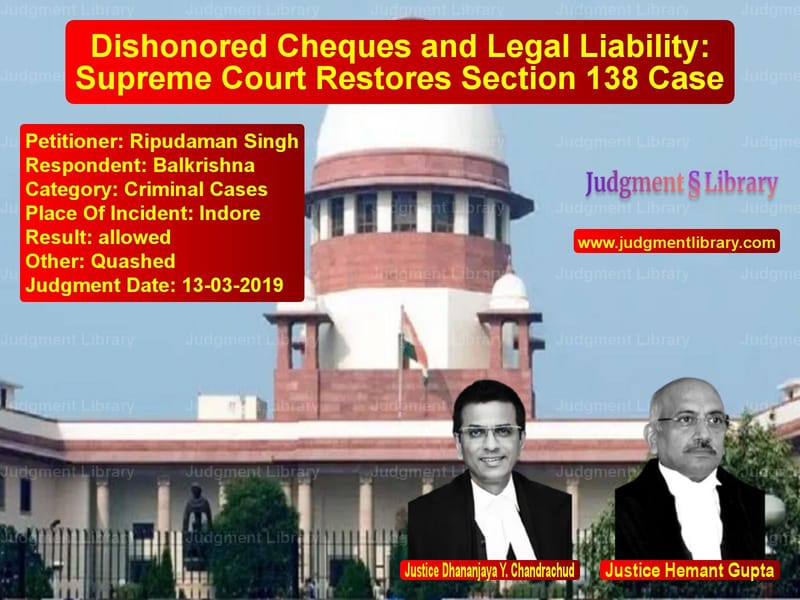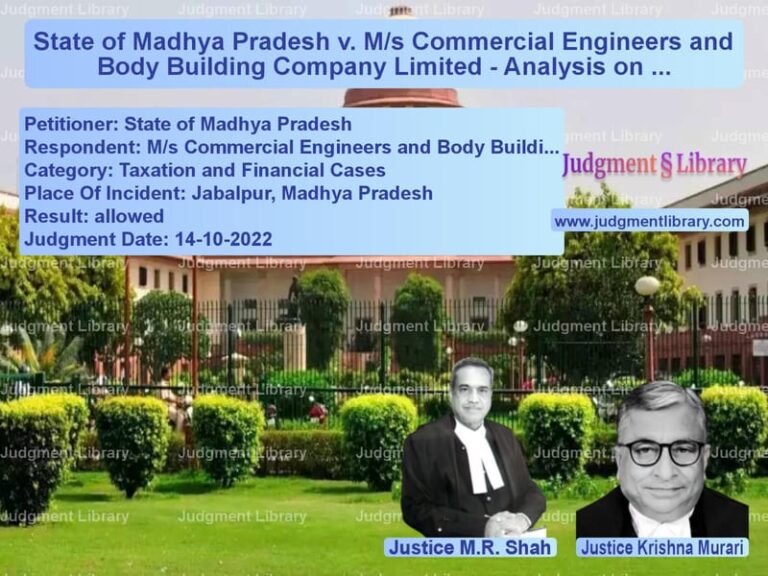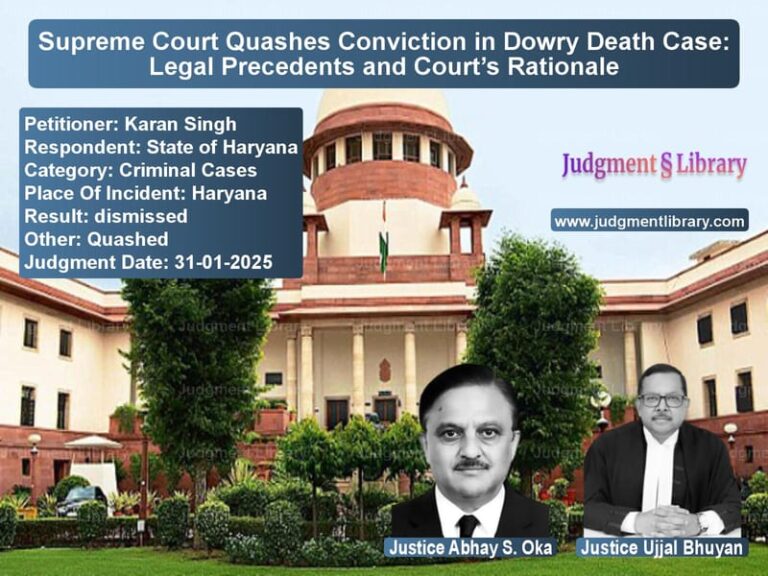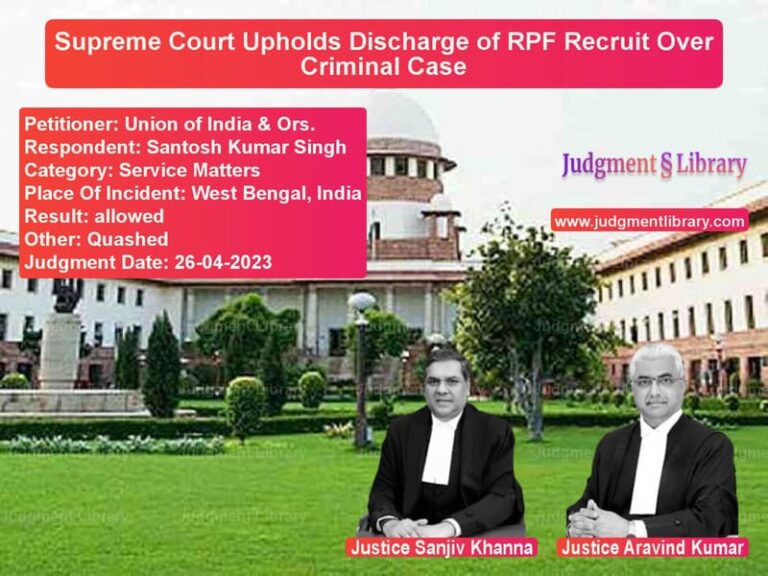Dishonored Cheques and Legal Liability: Supreme Court Restores Section 138 Case
The case of Ripudaman Singh vs. Balkrishna revolves around the dishonor of post-dated cheques issued as part of an agreement to sell immovable property. The Supreme Court, in its judgment dated March 13, 2019, examined whether the Madhya Pradesh High Court was justified in quashing a criminal complaint under Section 138 of the Negotiable Instruments Act, 1881. The ruling reinforces the principle that a cheque issued in pursuance of a legally enforceable debt or liability attracts criminal liability if dishonored.
The dispute arose when the appellants, Ripudaman Singh and his spouse, agreed to sell agricultural land to the respondent, Balkrishna, for Rs. 1.75 crore. The respondent issued two post-dated cheques of Rs. 25 lakh each to settle part of the payment. However, both cheques bounced due to insufficient funds, leading to a criminal complaint under Section 138 of the Negotiable Instruments Act. The High Court quashed the complaint, stating that the cheques were issued not as a legally enforceable debt but as part of a conditional transaction. The Supreme Court overturned this decision, restoring the case for trial.
Background of the Case
Ripudaman Singh and his spouse entered into an agreement to sell their agricultural land to Balkrishna on May 28, 2013. The agreement mentioned that:
- The total sale consideration was Rs. 1.75 crore.
- A sum of Rs. 1.25 crore was paid in cash at the time of agreement.
- The remaining balance was to be paid via two post-dated cheques of Rs. 25 lakh each issued by Balkrishna.
Details of the cheques:
- Cheque No. 297251 dated June 3, 2013 drawn on IndusInd Bank, Indore, in favor of Ripudaman Singh.
- Cheque No. 297252 dated July 2, 2013 drawn on IndusInd Bank, Indore, in favor of Smt. Usha (Ripudaman’s wife).
When presented for clearance, both cheques were dishonored due to insufficient funds. Legal notices were issued to Balkrishna on June 21, 2013 and August 13, 2013, demanding payment. Since no payment was made, complaints were filed under Section 138 of the Negotiable Instruments Act, 1881. The trial court took cognizance and issued process.
Respondent’s Defense and High Court Ruling
Balkrishna challenged the complaints, filing an application for discharge. His main arguments were:
- The cheques were issued as part of an agreement to sell, not as an independent financial obligation.
- Clause 4 of the agreement stated that if any dispute arose regarding the property, the balance payment via cheques would be made only after resolution.
- A civil suit regarding the property had been pending since 2011, meaning that the condition for payment was not met.
The High Court of Madhya Pradesh, in its judgment dated March 31, 2016, agreed with Balkrishna, ruling that:
- The cheques were not issued to discharge a debt but only as a mechanism for balance payment in a conditional agreement.
- Since a dispute regarding the property existed, the obligation to honor the cheques had not yet arisen.
- As a result, no legally enforceable debt existed at the time of cheque dishonor, and the criminal complaint was quashed.
Petitioner’s (Ripudaman Singh’s) Arguments in Supreme Court
The petitioners, represented by Senior Advocate Shyam Divan, challenged the High Court’s ruling on the following grounds:
- The High Court erred in interpreting Section 138, which states that a cheque dishonored due to insufficient funds attracts liability regardless of conditionality.
- The cheques were issued in furtherance of an agreement and formed part of a legally enforceable transaction.
- The respondent, acting on a General Power of Attorney, sold the same land on August 3, 2013, for Rs. 3.79 crore, proving that the transaction was not in dispute.
- Recourse to Section 482 CrPC to quash the complaint was an abuse of process and should not have been entertained.
Supreme Court’s Judgment
The Supreme Court, overturning the High Court’s decision, held:
- The cheques were issued in pursuance of a legally enforceable agreement, making them valid financial instruments.
- An agreement to sell may not create interest in immovable property, but it still constitutes a legally enforceable contract.
- Dishonor of cheques issued in a commercial transaction falls squarely within the ambit of Section 138.
- Clause 4 of the agreement did not absolve the respondent of liability but merely provided for dispute resolution. The respondent proceeded with further transactions, proving the property was not under dispute.
- The High Court’s intervention under Section 482 CrPC to quash the case was improper, as disputed facts must be decided through trial, not summary proceedings.
The Supreme Court ruled:
“We find ourselves unable to accept the finding of the learned Single Judge of the High Court that the cheques were not issued for creating any liability or debt, but only for the payment of balance consideration. The question as to whether there was a dispute as contemplated in Clause 4 of the Agreement to Sell cannot be the subject matter of a proceeding under Section 482 and is a matter to be determined on the basis of the evidence which may be adduced at the trial.”
Accordingly, the Supreme Court set aside the High Court’s order and restored the criminal complaints, allowing them to proceed before the trial court.
Key Takeaways from the Judgment
- Post-dated cheques issued in an agreement to sell property constitute legally enforceable debt.
- A dispute regarding property does not automatically invalidate financial obligations.
- Section 138 of the Negotiable Instruments Act applies even when cheques are issued for pending consideration.
- High Courts should not quash criminal cases under Section 482 CrPC when factual disputes exist.
- Dishonored cheques attract criminal liability irrespective of the underlying transaction’s conditionality.
Conclusion
The Supreme Court’s ruling in Ripudaman Singh vs. Balkrishna clarifies that post-dated cheques issued in commercial transactions carry legal liability under Section 138 of the Negotiable Instruments Act. The judgment prevents misuse of procedural loopholes and ensures that contractual obligations backed by cheques are honored. By restoring the criminal case, the Court reaffirmed that the defense of a pending dispute cannot be used to escape cheque-bounce liability.
Petitioner Name: Ripudaman Singh.Respondent Name: Balkrishna.Judgment By: Justice Dhananjaya Y. Chandrachud, Justice Hemant Gupta.Place Of Incident: Indore.Judgment Date: 13-03-2019.
Don’t miss out on the full details! Download the complete judgment in PDF format below and gain valuable insights instantly!
Download Judgment: Ripudaman Singh vs Balkrishna Supreme Court of India Judgment Dated 13-03-2019.pdf
Direct Downlaod Judgment: Direct downlaod this Judgment
See all petitions in Fraud and Forgery
See all petitions in Cheque Dishonour Cases
See all petitions in Judgment by Dhananjaya Y Chandrachud
See all petitions in Judgment by Hemant Gupta
See all petitions in allowed
See all petitions in Quashed
See all petitions in supreme court of India judgments March 2019
See all petitions in 2019 judgments
See all posts in Criminal Cases Category
See all allowed petitions in Criminal Cases Category
See all Dismissed petitions in Criminal Cases Category
See all partially allowed petitions in Criminal Cases Category







